We need a comprehensive lifelong learning policy and funding principles that support that policy. This is what 30 key organisations representing the employment sector, education and central government have outlined in a joint statement. Sitra has facilitated the joint discussions between the participants.
Who bears the responsibility for ensuring that people’s competence and skills do not become outdated during their careers? Is the shared money allocated in the right way for building the competence of adults? If more money is needed, where do we source it from? The publication Towards lifelong learning – the shared mindset, funding principles and challenges identifies eight challenges that are currently impeding the required reforms.
Now that the parliamentary elections are around the corner, there is a need for a debate on these challenges and the choices related to them, and lifelong learning must be given a central role in the next government programme.
The continuation of careers must be promoted before careers are disrupted
Competence, employment and sustainable careers can be supported by both funding and management. The organisations’ shared view of the funding principles has been recorded in the statement.
Workplaces and on-the-job learning are the most important learning environments for adults. Special support measures are therefore needed to ensure that people who are not in employment can also participate in competence building.
Unemployment benefit and different income-related benefits such as housing allowance and parental allowances can be obstacles to or incentives for competence building, depending on the situation.
“Their impacts on the preconditions for lifelong learning must be carefully assessed in future reforms. One starting point should be that benefits should encourage people to build their competence,” the statement says.
The aim is also to create incentives for workplaces so that employers will enhance the competence of their personnel. Companies’ investments in intellectual capital should be made visible as information gathered on them is likely to encourage employers, entrepreneurs and employees to invest more in competence.
Every year, central government and local authorities channel 15.5 billion euros to lifelong learning. Public resources should be directed in a way that enables everyone to learn the basic skills and maintain these skills continuously throughout their life. Publicly funded education and training that takes place throughout the working career should be directed in particular at people whose careers are at risk of being disrupted and whose capacities to find employment are weak.
Learning must be considered in all decision-making
The transition to a policy of lifelong learning is necessary because both Finland’s success in the long term and the future well-being of Finns largely depend on competence.
Lifelong learning should be managed as an entity and with long-term goals: “All operating models and solutions used in lifelong learning must be managed as parts of the same entity, enabling their mutual interaction. What is needed is a new kind of systemic management,” the statement emphasises.
At a more general level, learning opportunities should be taken into consideration in all societal decision-making and actively promoted in all administrative sectors and industries.
“In a wider sense, lifelong learning is not only about competences, competitiveness and well-being but also about the core of our society – education, inclusion and prevention of social inequality,” according to the introduction by the leaders of the 30 organisations.
The publication Towards lifelong learning was drawn up between the autumn of 2018 and the beginning of 2019. Thirty key organisations, their most senior leaders and a number of experts were invited by Sitra to participate in the work. The shared mindset for lifelong learning included in the publication and its four theses were published in February 2019.
The following organisations have participated in drawing up the shared mindset, challenges and funding principles: Confederation of Unions for Professional and Managerial Staff in Finland Akava; Rectors’ Conference of Finnish Universities of Applied Sciences Arene; Finnish Association for the Development of Vocational Education and Training make; Confederation of Finnish Industries EK; the Finnish Education Evaluation Centre FINEEC; Ilmarinen Mutual Pension Insurance Company; Varma Mutual Pension Insurance Company; the Finland Chamber of Commerce; Keva; KT Local Government Employers; the Trade Union of Education OAJ; the Finnish National Agency for Education; the Ministry of Education and Culture; Finnish Education Employers; the Ministry of Social Affairs and Health; the National Union of Vocational Students in Finland SAKKI; the Central Organisation of Finnish Trade Unions SAK; the Association of Finnish Local and Regional Authorities; Suomen Opiskelija-Allianssi – OSKU; Suomen opiskelijakuntien liitto – SAMOK; Universities Finland UNIFI; the National Union of University Students in Finland SYL; Suomen Yrittäjät; the Finnish Confederation of Salaried Employees STTK; the Finnish Pension Alliance TELA; the Ministry of Economic Affairs and Employment; the Prime Minister’s Office; the Office for the Government as Employer; the Ministry of Finance; and the Finnish Adult Education Association.
Sitra’s three-year Lifelong learning project was launched in October 2018. Sitra will continue to facilitate joint discussions between different parties and is committed to promoting lifelong learning based on jointly formulated views.



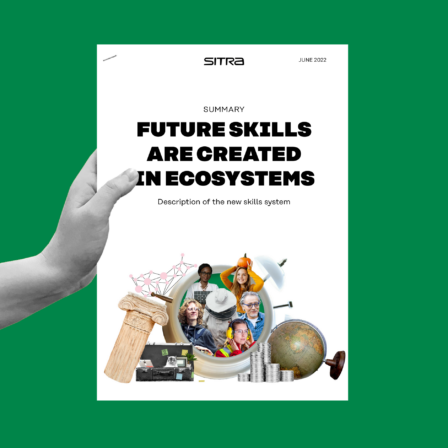
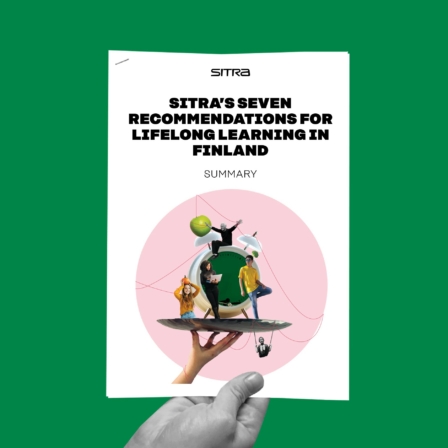


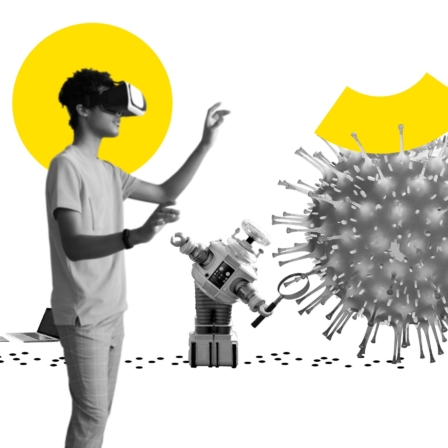






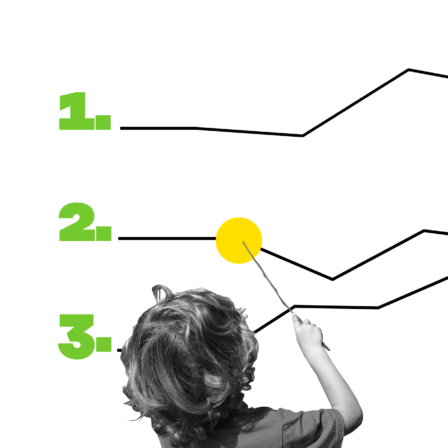


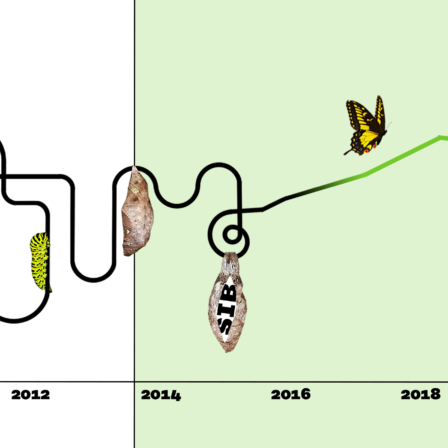

Recommended
Have some more.